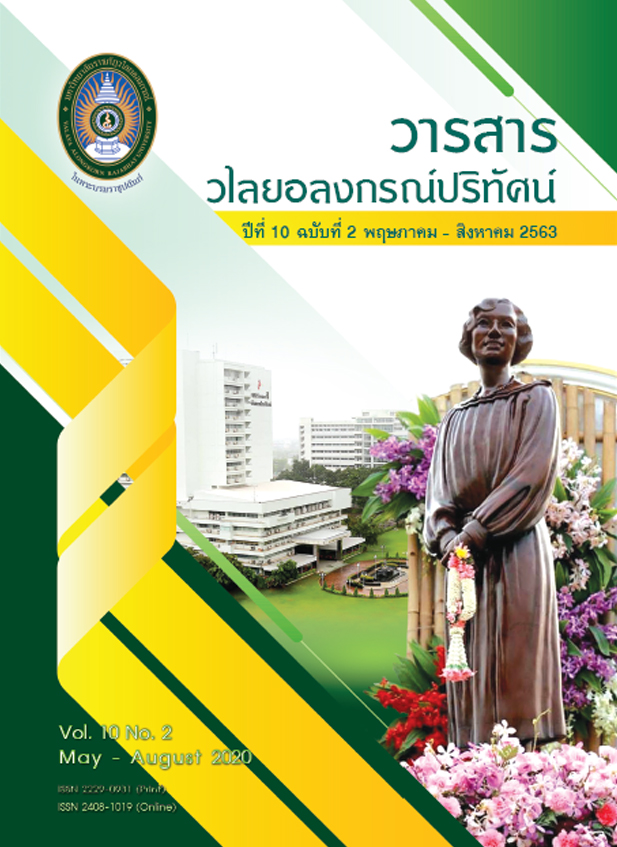ความผิดอาญาเกี่ยวกับทรัพย์: ศึกษาเปรียบเทียบแนวคิด แห่งกฎหมายอาญาไทยกับแนวคิดอทินนาทานแห่งพระพุทธศาสนาเถรวาท
คำสำคัญ:
ความผิดอาญาเกี่ยวกับทรัพย์, กฎหมายอาญาไทย, อทินนาทาน, พระพุทธศาสนาเถรวาทบทคัดย่อ
งานวิจัยนี้มีวัตถุประสงค์เพื่อ 1) ศึกษาแนวคิดความผิดอาญาเกี่ยวกับทรัพย์ในกฎหมายอาญาไทย 2) ศึกษาแนวคิดอทินนาทานในพระพุทธศาสนาเถรวาท และ 3) วิเคราะห์เปรียบเทียบแนวคิดกฎหมายอาญาไทยกับแนวคิดอทินนาทานในพระพุทธศาสนาเถรวาท ภายในกรอบแนวคิด 3 ประการ คือ 1) การกำหนดลักษณะความผิด 2) การกำหนดลักษณะโจรกรรม และ 3) การกำหนดลักษณะโทษ โดยเป็นการวิจัยเชิงเอกสารที่เกี่ยวข้องกับความผิดอาญาเกี่ยวกับทรัพย์ด้านกฎหมายอาญาไทย ได้แก่ กฎหมายตราสามดวง กฎหมายลักษณะอาญา ร.ศ.127 และประมวลกฎหมายอาญา และศึกษาเอกสารแนวคิดแห่งพระพุทธศาสนาเถรวาท ได้แก่คัมภีร์พระไตรปิฎกหรือคัมภีร์อื่นที่เกี่ยวข้อง
จากการศึกษาตามวัตถุประสงค์ประการแรก ผลการศึกษาพบว่า แนวคิดกฎหมายอาญาไทยมีการกำหนดกรอบแนวคิด 3 ลักษณะ คือ 1) การกำหนดลักษณะความผิด เช่น เจตนาทุจริต 2) การกำหนดลักษณะโจรกรรม เช่น ลักทรัพย์ ปล้นทรัพย์ และ 3) การกำหนดลักษณะโทษ เช่น โทษหนักและโทษเบา ได้แก่ประหารชีวิต จำคุก เป็นต้น ตามวัตถุประสงค์การศึกษาประการที่สอง ผลการศึกษาพบว่า แนวคิดอทินนาทานแห่งพระพุทธศาสนาเถรวาทได้มีกรอบแนวคิดความผิดเกี่ยวกับทรัพย์ไว้ 3 ลักษณะ คือ 1) การกำหนดลักษณะความผิด เช่น มีเจตนาทุจริต 2) การกำหนดลักษณะโจรกรรม เช่น ลักทรัพย์ ปล้นทรัพย์ และ 3) การกำหนด ลักษณะโทษ เช่น โทษหนักและ โทษเบา และจากการศึกษาตามวัตถุประสงค์ประการที่สาม ผลการศึกษาพบว่า แนวคิดกฎหมายอาญาไทยกับแนวคิดอทินนาทานแห่งพระพุทธศาสนาเถรวาท มีความสอดคล้องในการกำหนดลักษณะความผิด เช่นมีการกำหนดลักษณะองค์ประกอบที่เป็นสาระสำคัญ ได้แก่ “เจตนาทุจริต” มีการกำหนดลักษณะโจรกรรมสอดคล้องกัน เช่น ลักทรัพย์ ปล้นทรัพย์ และการกำหนดลักษณะโทษจะมีโทษหนักและโทษเบา ส่วนความแตกต่างที่สำคัญคือ กฎหมายอาญาไทยไม่ได้กล่าวถึง การลงโทษหลังความตาย แต่การลงโทษตามพระไอยการลักษณะโจรในกฎหมายตราสามดวง มีบทลงโทษที่รุนแรง เสมือนเป็นการลงทัณฑ์คนบาปในนรกคล้ายแนวคิดแห่งพระพุทธศาสนาเถรวาท
เอกสารอ้างอิง
มหาจุฬาลงกรณราชวิทยาลัย. (2539). พระไตรปิฎกภาษาไทย ฉบับมหาจุฬาลงกรณราชวิทยาลัย. กรุงเทพฯ: มหาจุฬาลงกรณราชวิทยาลัย.
มหามกุฏราชวิทยาลัย. (2544). ปฐมสมันตปาสาทิกาแปล เล่ม ๒. กรุงเทพฯ: มหามกุฏราชวิทยาลัย.
สมเด็จพระมหาสมณเจ้า กรมพระยาวชิรญาณวโรรส. (2538). เบญจศีลและเบญจธรรม. กรุงเทพฯ: มหามกุฏราชวิทยาลัย.
วราภรณ์ คริศณุ. (2552). ประมวลกฎหมายอาญา. กรุงเทพฯ: วิทยพัฒน์.
หยุด แสงอุทัย. (2548). คำอธิบายกฎหมายลักษณะอาญา ร.ศ. ๑๒๗. กรุงเทพฯ: วิญญูชน.
ดาวน์โหลด
เผยแพร่แล้ว
รูปแบบการอ้างอิง
ฉบับ
ประเภทบทความ
สัญญาอนุญาต
ข้อความที่ปรากฏในบทความแต่ละเรื่องในวารสารวไลยอลงกรณ์ปริทัศน์ เป็นความคิดเห็นของผู้นิพนธ์แต่ละท่าน มิใช่เป็นทัศนะและมิใช่ความรับผิดชอบของกองบรรณาธิการจัดทำวารสาร และ
มหาวิทยาลัยราชภัฏวไลยอลงกรณ์ ในพระบรมราชูปถัมภ์


